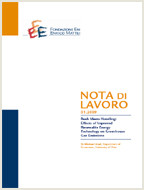Uncertainty and Natural Resources – Prudence Facing Doomsday

Data
27.05.2015
27.05.2015
Autori
Johannes Emmerling (Fondazione Eni Enrico Mattei, Euro-Mediterranean Center on Climate Change CMCC)
Codice JEL
Q30, D81
Q30, D81
Parole chiave:
Expected Utility, Non-Renewable Resource, Prudence, Uncertainty
Expected Utility, Non-Renewable Resource, Prudence, Uncertainty
Publisher
Climate Change and Sustainable Development
Climate Change and Sustainable Development
Editor
Carlo Carraro
Carlo Carraro
This paper studies the optimal extraction of a non-renewable resource under uncertainty using a discrete-time approach in the spirit of the literature on precautionary savings. We find that boundedness of the utility function, in particular the assumption about U(0), gives very different results in the two settings which are often considered as equivalent. For a bounded utility function, we show that in a standard two-period setting, prudence is no longer sufficient to ensure a more conservationist extraction policy than under certainty. If on the other hand we increase the number of periods to infinity, we find that prudence is not anymore not anymore necessary to induce a more conservationist extraction policy and risk aversion is sufficient. These results highlight the importance of the specification of the utility function and its behavior at the point of origin.
***
Suggested citation: Emmerling, J., (2015), ‘Uncertainty and Natural Resources – Prudence Facing Doomsday’, Nota di Lavoro 49.2015, Milan, Italy: Fondazione Eni Enrico Mattei
